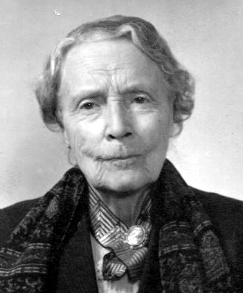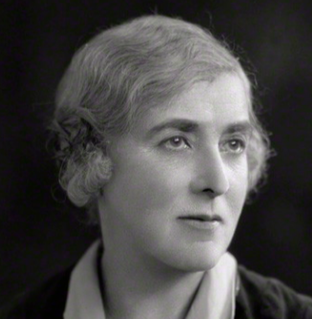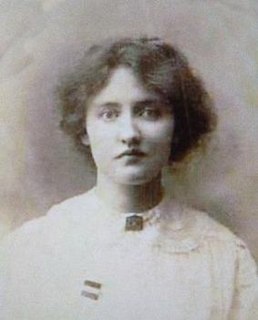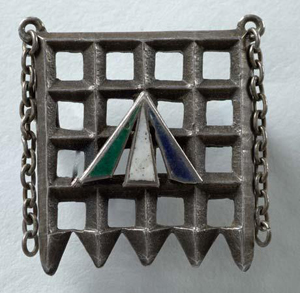Related Research Articles

Marion Wallace Dunlop was a Scottish artist and author. She was the first and one of the most well known British suffragettes to go on hunger strike, on 5 July 1909, after being arrested in July 1909 for militancy. She said she would not take any food unless she was treated as a political prisoner instead of as a common criminal. Wallace Dunlop's mode of protest influenced suffragettes after her and other leaders like M. K. Gandhi and James Connolly, who also used fasting to protest British rule. She was at the centre of the Women's Social and Political Union and designed processions and banners for them.

Frances Mary "Fanny" Parker was a New Zealand-born suffragette who became prominent in the militant wing of the Scottish women's suffrage movement and was repeatedly imprisoned for her actions.

A suffragette was a member of an activist women's organisation in the early 20th century who, under the banner "Votes for Women", fought for the right to vote in public elections. The term refers in particular to members of the British Women's Social and Political Union (WSPU), a women-only movement founded in 1903 by Emmeline Pankhurst, which engaged in direct action and civil disobedience. In 1906, a reporter writing in the Daily Mail coined the term suffragette for the WSPU, from suffragist, to belittle the women advocating women's suffrage. The militants embraced the new name, even adopting it for use as the title of the newspaper published by the WSPU.

Ethel Agnes Mary Moorhead was a British suffragette and painter and was the first suffragette in Scotland to be forcibly-fed.

Jane "Janie" Allan was a leading source of funding and a Scottish activist for the militant suffragette movement of the early 20th century.

Mary Elizabeth Phillips was a suffragette, feminist and socialist. She was the longest prison serving suffragette. She worked for Christabel Pankhurst but was sacked; she then worked for Sylvia Pankhurst under name Mary Pederson. In later life she supported women's and children's organisations.

Helen Alexander Archdale was a Scottish feminist, suffragette and journalist. Archdale was the Sheffield branch organiser for the Women's Social and Political Union and later its prisoners' secretary in London.

Arabella Scott was a Scottish suffragette and campaigner. She underwent hunger and thirst strikes when she was sent to jail and was released under the Cat and Mouse Act.

Frances Graves aka Frances Gordon was a British suffragette who became prominent in the militant wing of the Scottish women's suffrage movement prior to the First World War and was imprisoned and force-fed for her actions.
Caroline Phillips was a Scottish feminist, suffragette and journalist. She was honorary secretary of the Aberdeen branch of the Women's Social and Political Union (WSPU), met and corresponded with many of the leaders of the movement and was also involved in the organisation of militant action in Aberdeen.
Jessie Cunningham Methven was a Scottish campaigner for women's suffrage. She was honorary secretary of the Edinburgh National Society for Women's Suffrage from the mid 1890s until 1906. She subsequently joined the more militant Women's Social and Political Union and described herself as an "independent socialist".

Janet Barrowman was a Scottish suffragette.

Edith Hudson was a British nurse and suffragette. She was an active member of the Edinburgh branch of the Women's Social and Political Union (WSPU) and was arrested several times for her part in their protests in Scotland and London. She engaged in hunger strikes while in prison and was forcibly fed. She was released after the last of these strikes under the so-called Cat and Mouse Act. Hudson was awarded a Hunger Strike Medal 'for Valour' by the WSPU.
Elizabeth and Agnes Thomson were Scottish suffragettes and members of the Edinburgh branch of the Women's Social and Political Union. They were arrested for their involvement in WSPU protests in Scotland and London. The sisters were involved in the first arson attempt in Scotland as part of the WSPU arson campaign in 1913. Elizabeth was imprisoned for her role and went on hunger strike. She was later released under the Prisoners Act 1913, so-called Cat and Mouse Act. Elizabeth was awarded a Hunger Strike Medal 'for Valour' by the WSPU.
Catherine Corbett (1869–1950) was a British suffragette, one of those imprisoned and awarded the Hunger Strike Medal, for the cause of the Women's Social and Political Union.

The Holloway brooch was presented by the Women's Social and Political Union (WPSU) to women who had been imprisoned at Holloway Prison for militant suffragette activity. It is also referred to as the "Portcullis badge", the "Holloway Prison brooch" and the "Victoria Cross of the Union".

The Hunger Strike Medal was a silver medal awarded by the leadership of the Women's Social and Political Union (WSPU) to suffragette prisoners who had gone on hunger strike for not being recognised as political prisoners while serving sentences in the prisons of the United Kingdom. Many women were force-fed.

Women's suffrage was the seeking of the right of women to vote in elections. It was carried out by both men and women, it was a very elongated and gruelling campaign that went on for 86 years before the Representation of the People Act 1918 was introduced on 6 February 1918, which provided a few women with the right to vote.

The Stornoway Women's Suffrage Association was an organisation involved in campaigning for women's suffrage, based in Stornoway, Lewis in the Western Isles of Scotland, the Hebrides.
References
- ↑ The Biographical Dictionary of Scottish Women. Edinburgh University Press. 2006. ISBN 0-7486-1713-2.
- 1 2 Atkinson, Diane (2018-02-08). Rise Up Women!: The Remarkable Lives of the Suffragettes. Bloomsbury Publishing. ISBN 9781408844069.
- ↑ Liddington, Jill (2006). Rebel Girls: How votes for women changed Edwardian lives. Virago.
- ↑ "International Women's Day: Brighton's pioneering female doctors - The Keep". The Keep. 2015-03-09. Retrieved 2018-03-08.
- ↑ Dart, Anna Coggins (1959). Shining Cycles of Love. University of California: Wayside Press. pp. 16.
- ↑ Leneman, L (1994). "Medical Women at War 1914-1918". Medical History. 38 (2): 160–177. doi:10.1017/s0025727300059081. PMC 1036842 . PMID 8007751.
- 1 2 "Helen Boyle - mastersport.co.uk". www.womenofbrighton.co.uk. Retrieved 2018-03-08.
- ↑ Sarah, Pedersen (2017-07-03). The Scottish suffragettes and the press. London, United Kingdom. ISBN 9781137538345. OCLC 992988822.
- ↑ Pedersen, Sarah (2017-07-03). The Scottish Suffragettes and the Press. Springer. ISBN 9781137538345.
- ↑ Parliamentary Debates (official report): House of Commons. Great Britain: H.M.Stationery Office. 1914. pp. cclvi.
- ↑ Leneman, Leah (1993). Martyrs in our mydst. Dundee, Perth and the forcible feeding of suffragettes. Dundee: The Abertay Historical Society. p. 30.
- ↑ Crawford, Elizabeth (2003-09-02). The Women's Suffrage Movement: A Reference Guide 1866-1928. ISBN 978-1135434021.
- ↑ "The Treatment of Mrs Pankhurst: Dr Mabel Jones's statement". Women's Library Archive; Katie Gliddon Papers . 11 Mar 1914. Retrieved 23 August 2018.
- ↑ Michaelsen, Kaaren Leigh (2003). Becoming 'medical women': British Female Physicians and the Politics of Professionalism. Berkeley: University of California. p. 217.


